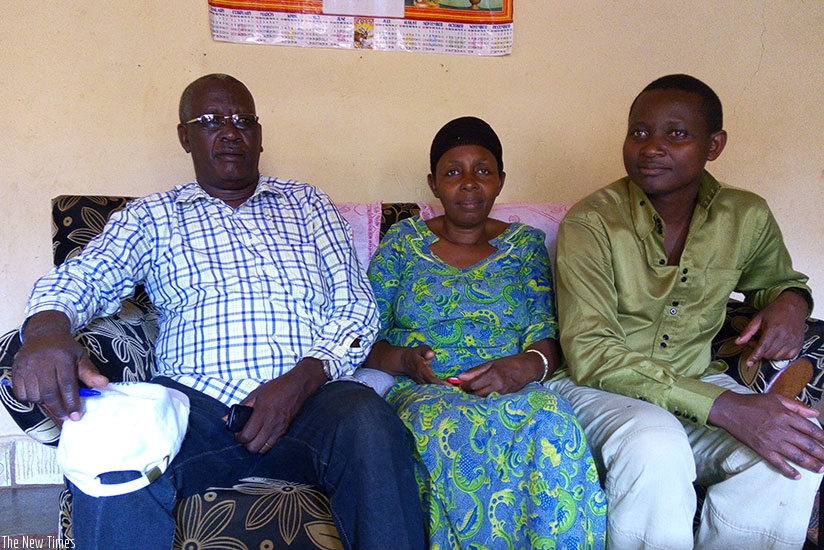On April 7, 1994, Pastor Gratien Mitsindo boldly stood his ground before guns, grenades, machetes, hammers and other weapons as he refused to give up 320 Tutsi he had hidden, into Interahamwe militia’s hands.


On April 7, 1994, Pastor Gratien Mitsindo boldly stood his ground before guns, grenades, machetes, hammers and other weapons as he refused to give up 320 Tutsi he had hidden, into Interahamwe militia’s hands.
The now father of nine told Saturday Times from his residence in Jabana Sector, Gasabo District that he could not bear to see blood of innocent people being cruelly shed.
Standing in the church’s doorway, he denied the militia entrance into the church.
During the Genocide period, Mitsindo was the Pastor of Nyabubare Parish in the former Bicumbi Commune, in the current Karenge Sector of Rwamagana District in Eastern Province.
He is currently the pastor for Jabana Parish in Gasabo District.
Many clerics have been convicted for their participation in the 1994 Genocide against the Tutsi while others are still at large.
Thousands of Tutsi perished in churches where they had sought refuge. Some 15,000 Tutsi were killed at two churches in Bugesera District.
But other clerics, like Mitsindo, strived to save life. He said that some pastors even risked their lives together with those they were hiding.
Later, he recounts, the Interahamwe militia left the church saying that they were going to kill other Tutsi but would be back to kill those in the church as they already knew their whereabouts.
Having learnt that Interahamwe were burning Tutsi hiding in churches else where, he decided to hide the people under his protection in his pastoral residence.
On their return to the church, the Interahamwe found no Tutsi in the church. Filled with rage, the perpetrators went wild and stormed the pastor’s house searching for Tutsi.
Recounting the ordeal, he said that one militia raised a hammer to smash a female nurse’s head but Mitsindo firmly grabbed it to save the woman, telling the perpetrators that if they wanted to kill them, they should kill him first.
Soon after, he recalled, a disagreement emerged among the attackers on whether to kill him and the Tutsi he was hiding but after some time, they left without killing them.
"I was determined to save the lives of the people I hid, and I was prepared to pay any price to achieve that. I decided that if I was to die and the people I was with I would die first instead of seeing them being killed in my presence,” he said.
"My wife, children and I resolved to die first instead of seeing the bodies of the people we were hiding dying in our presence,” he said.
Mitsindo spent over one month with the 320 Tutsi he hid. To feed them, he said that some of the church members would collect food to supplement the food he had in his store.
He said that if every Rwandan who was not being hunted had managed to save at least 10 Tutsi, the Genocide would not have claimed over 1 million lives in three months’ time.
Karenge Sector’s Gacaca Court, on January 11, 2006, commended Mtsindo for his heroic action.
For Gaspard Kalisa, 52, his spirit to save, care for lives of others comes from his father, who saved the lives of Tutsi family when they were being persecuted in the 1960s.
He said that his family – himself, his father and his younger brother - hid 30 Tutsi until the Genocide ended.
Kalisa, who was born in the former Rubungo Commune, in the current Bumbogo Sector of Gasabo District, said that during the Genocide, they would dig tunnels on hillsides around their homes, put the Tutsi inside and cover it with grass.
"I was determined to save people because I could not stand injustice,” he told Saturday Times.
"We are all the same. Those who think they are Hutu, Tutsi or Twa are wrong,” he said.
"What makes me happy is that I now see them as my family. When I have a problem, they support me,” he said.
However, not everything is rosy.
"Some Hutu hate me saying that we were traitors. Some Hutu who participated in the Genocide against the Tutsi think that if all the Tutsi had been killed, no one would have accused them of the crimes they committed,” he said.
The Executive Secretary of Ibuka, an umbrella organisation of survivors associations, Naphtal Ahishakiye, said that a pilot study identified 271 people who hid Tutsi during the Genocide.
The survey was carried out in 2009-2010 in two sectors of each of the 30 districts across the country – meaning 60 sectors out of 416. He added that, Ibuka plans to conduct the study to other parts of the country.
Ibuka says that the people who saved lives can be good teachers for unity and reconciliation.
"They have a strong voice among Genocide survivors because they saved lives,” he said underscoring that such people showed humanity and kindness which should be emulated by everyone.
Such people are fondly refered to as A barinzi b’ Igihango.
editorial@newtimes.co.rw


